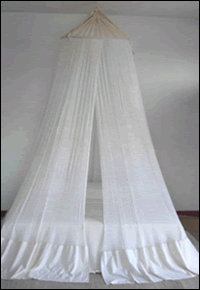Malaria Control : Mosquito Nets have a Hidden Agenda
US President George Bush was hailed by Tanzania’s authorities for his endeavor to rid Tanzania of Malaria, by his generous donation of mosquito nets. Zanzibar Island was cited as a success story in this venture. Whereas the people of America should be thanked for their anti-malaria philanthropy, Tanzanians ought to ask themselves whether mosquito nets will exterminate malaria.
The average Tanzanian spends very little time in bed. A majority of youth, for example, are students. They sit up to late hours of the night studying and being feasted upon by mosquitoes. Individuals who drink sit up to midnight in bars being bitten by mosquitoes. They then resort to their homes to hide behind the ‘safety’ of their mosquito nets.
Most Tanzanians are bitten by mosquitoes before they retire to their beds. Hence the use of mosquito nets is not effective at all. One morning, I boarded a public transport vehicle. When the driver switched on the air conditioner, too many mosquitoes emerged from the fan openings and filled the van. We had to open the windows to let out the mosquitoes before proceeding with our journey. If there were hundreds of mosquitoes in the car in the morning, how many passengers had been bitten in the night? Do watchmen arm themselves with mosquito nets?
 |
Although a beggar has no choice, we ought to know that we live in a world driven by self interest. America is not giving us mosquito nets because it loves us. There is something it is gaining out of the whole project. The Arusha declaration clearly explains that free goodies are worse than loans for no one gives out something without expecting profit.
Instead of rejoicing over free goodies that don’t offer a permanent solution to the malaria situation in our country, we must come up with decisive action plans to save our citizens. Rather than deal with symptoms of a problem, we must address the cause. We shall not solve the malaria menace while we have poor drainage systems around our homes. We shall not eradicate mosquitoes if we depend on nets alone. Residual spraying must be incorporated in this fight even if it demands that citizens remit a fee to have their compounds sprayed. Indoor residual spraying used to be the norm in the 1970s in Dar es Salaam. Then, malaria infections were minimal.
As Tanzanians perish due to malaria, mosquito net industries are doing booming business. There industries are feeding on the problem and would collapse if malaria was eradicated. That’s why they can’t allow use of chemicals that would totally eradicate mosquitoes. Earlier on, when one would treat a net, mosquitoes would not approach it- but today, in spite of the treatment, mosquitoes hold a conference on the nets! There must be a hidden agenda by the mosquito repellant manufacturers – to do more business.
Our media has joined this fray by making the public believe that malaria is caused by mosquitoes that bite late in the night. If one accompanied tourists one evening in Dar es Salaam, he will realize that every evening, they apply some anti – mosquito balm onto their skin. Whereas foreigners do this every evening, we wait till dark to enter into the nets after being cheated that mosquitoes bite late in the night.
It is time we looked at the gift horse in the mouth. We must find out how developed countries rid themselves of malaria and question why they can’t allow us to use the same procedure. Unless the ministry of health puts the interests of its people first and takes radical measures to rid Tanzania of malaria, we are doomed in these mosquito nets!
